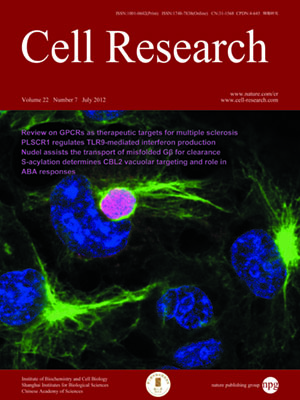
Volume 22, No 7, Jul 2012
ISSN: 1001-0602
EISSN: 1748-7838 2018
impact factor 17.848*
(Clarivate Analytics, 2019)
Volume 22 Issue 7, July 2012: 1140-1154
ORIGINAL ARTICLES
Misfolded Gβ is recruited to cytoplasmic dynein by Nudel for efficient clearance
Yihan Wan, Zhenye Yang, Jing Guo, Qiangge Zhang, Liyong Zeng, Wei Song, Yue Xiao and Xueliang Zhu
State Key Laboratory of Cell Biology, Institute of Biochemistry and Cell Biology, Shanghai Institutes for Biological Sciences, Chinese Academy of Sciences, 320 Yue Yang Road, Shanghai 200031, China
Correspondence: Xueliang Zhu,(xlzhu@sibs.ac.cn)
The Gβγ heterodimer is an important signal transducer. Gβ, however, is prone to misfolding due to its requirement for Gγ and chaperones for proper folding. How cells dispose of misfolded Gβ (mfGβ) is not clear. Here, we showed that mfGβ was able to be polyubiquitinated and subsequently degraded by the proteasome. It was sequestered in aggresomes after the inhibition of the proteasome activity with MG132. Sustained activation of Gβγ signaling further elevated cellular levels of the ubiquitinated Gβ. Moreover, Nudel, a regulator of cytoplasmic dynein, the microtubule minus end-directed motor, directly interacted with both the unubiquitinated and ubiquitinated mfGβ. Increasing the levels of both mfGβ and Nudel promoted the association of Gβ with both Nudel and dynein, resulting in robust aggresome formation in a dynein-dependent manner. Depletion of Nudel by RNAi reduced the dynein-associated mfGβ, impaired the MG132-induced aggresome formation, and markedly prolonged the half-life of nascent Gβ. Therefore, cytosolic mfGβ is recruited to dynein by Nudel and transported to the centrosome for rapid sequestration and degradation. Such a process not only eliminates mfGβ efficiently for the control of protein quality, but may also help to terminate the Gβγ signaling.
Cell Research (2012) 22:1140-1154. doi:10.1038/cr.2012.41; published online 20 March 2012
FULL TEXT | PDF
Browse 2102


